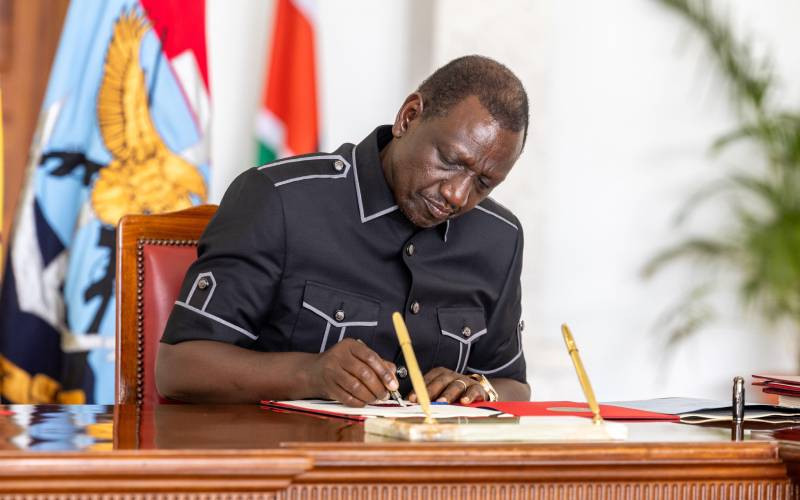American political analyst Mark McKinnon said public officers should do whatever possible and practical to encourage an environment of cooperation and bipartisanship.
He went on to assert that they should maintain a certain level of decorum, diplomacy and decency. But what played out on social media this week and which attracted juicy headlines on leading local dailies was despicable to say the least.
Chief Justice Dr Willy Mutunga, who is the President of the Supreme Court, came out publicly to deny that the Judiciary owns an official CJ’s residence.
The country’s top man in the helm of justice said he has no official residence. He went ahead to reveal that he earns Sh100,000 in house allowance which is taxed...That’s not all. Mutunga declared publicly that he lives in a rented apartment.
He not only made the rather embarrassing announcement on his official twitter page, but also went ahead to send an official statement to media houses affirming the same.
Do not get me wrong; residing in a rented apartment is not of major concern here.
Fact is Mutunga could have easily forgotten that the property in question cost the taxpayer Sh310 million.
And even though it is under investigations by the Ethics and Anti-corruption Commission (EACC) it doesn’t cease being a property of the Judiciary.
Unexpectedly though, Mutunga found himself in a stroppy position when former Chief Registrar of the Judiciary Gladys Shollei slapped his statement with documents showing purchase of the house.
The conversation went on on twitter and other social sites but it is impossible to understand why a senior public officer denied that the Judiciary does not own such property?
The Judiciary made payment last year. Fact. Anyone who has been following investigations by Parliament’s Public Accounts Committee (PAC) will recall that the committee visited the CJ’s residence in Runda sometime in July.
The building was then undergoing renovations and security guards were present in location.
Muthama Holdings—the owners of the property—confirmed to PAC that they had received full payment from the Judiciary. They further submitted bank statements showing receipt of payment from the Judiciary. This affirmation can be traced in the committee’s Hansard.
One pertinent question that then arises is why would a public officer who is answerable to Kenyans hide behind allegations of corruption surrounding the purchase of the house?
Stay informed. Subscribe to our newsletter
President Uhuru Kenyatta has been talking tough on spending and specifically, the Head of State has warned public officers against wastage of public funds.
Yet the Judiciary has been hiding behind what it terms as ongoing investigations over corruption claims that mar most of its projects. Some of the projects that have stalled include a Sh106 milllion containerised data centre that remains unused even though 80 per cent of the amount has been paid, as well as fully furnished offices at Elgon Place building that cost the tax payer Sh70 million in rent.
The construction of prefabricated court buildings costing a whooping Sh600 million remains suspended as the so-called investigations continue. If indeed there were any acts of corruption, the EACC should come clear and inform Kenyans.
Several Judiciary officers lost their jobs in unclear circumstances as claims of corruption took centre stage. No one has been found culpable of the said acts to date. The spirit of transformation in the crucial arm of government continues to be massacred.
And even though the law does not give the arm of government autocratic rights to carry out administration in the Judiciary without being accountable to Kenyans. Mutunga for unknown reasons failed to honour summons by PAC to shed more light on the said corrupt allegations.
The Constitution stipulates that State organs, State officers and public officers are responsible to the citizenry for their decisions and Mutunga is no exception.
Moving forward, we cannot have public funds go to waste in the name of invisible and imaginary investigations. Mutunga must focus on transforming the Judiciary that is now struggling to win public confidence instead of engaging in social media fights with a former official who left over a year ago.
Lest we forget, Chapter Six of the Constitution on Leadership and Integrity aptly states that all State officers shall behave, whether in public and official life, in private life, or in association with other persons, in a manner that avoids any conflict between personal interests and public or official duties.
Further, they should behave in a manner that avoids compromising any public or official interest in favour of a personal interest or demeaning the office the officer holds.
Mutunga, should work towards ridding the Judiciary of its corrupt baggage and upholding the Rule of Law for the little time left in his tenure.
After all the first responsibility of a leader is to define reality. The last is to say thank you. In between, the leader is a servant.
 The Standard Group Plc is a
multi-media organization with investments in media platforms spanning newspaper
print operations, television, radio broadcasting, digital and online services. The
Standard Group is recognized as a leading multi-media house in Kenya with a key
influence in matters of national and international interest.
The Standard Group Plc is a
multi-media organization with investments in media platforms spanning newspaper
print operations, television, radio broadcasting, digital and online services. The
Standard Group is recognized as a leading multi-media house in Kenya with a key
influence in matters of national and international interest.
 The Standard Group Plc is a
multi-media organization with investments in media platforms spanning newspaper
print operations, television, radio broadcasting, digital and online services. The
Standard Group is recognized as a leading multi-media house in Kenya with a key
influence in matters of national and international interest.
The Standard Group Plc is a
multi-media organization with investments in media platforms spanning newspaper
print operations, television, radio broadcasting, digital and online services. The
Standard Group is recognized as a leading multi-media house in Kenya with a key
influence in matters of national and international interest.








